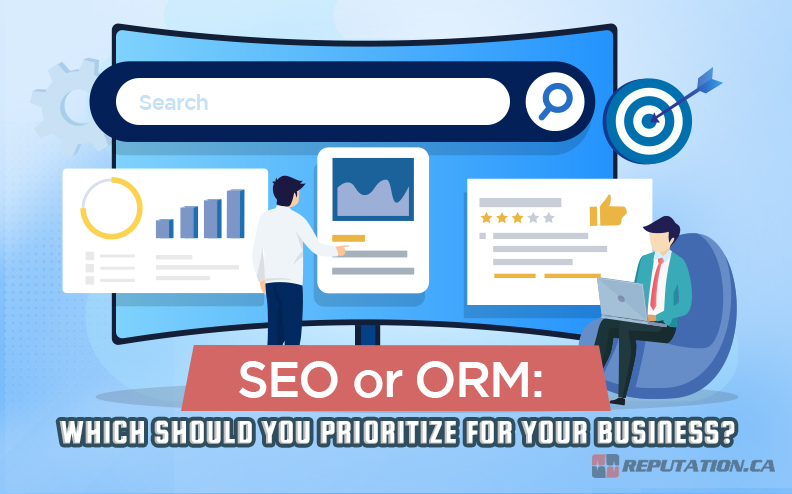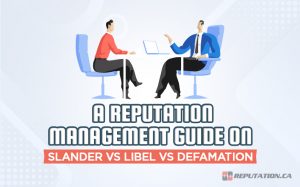Operating a business in the modern era requires a degree of technical literacy since the bulk of your consumers are on electronic platforms. As a result, several aspects of corporate management have evolved to accommodate these new platforms. Without the proper resources and practices, it is more likely that your business will fall behind and you will lose your customers.
It can also turn maintaining your company’s reputation into a challenge since the algorithms used by search engines can skew data against you. Fortunately, the details of online information mean an entity or individual can nudge the results in another direction. Unfortunately, this does not prevent people from discovering details about you that are publicly available. This means maintaining your public image requires knowledge of multiple data management tactics.
There are 2 major practices that can directly affect your business’s online presence and how your consumers perceive it. SEO and ORM can have drastic effects that can make or break your company’s online presence. The problem is that too many people are unaware of what these are and what effect they generate.
Understanding SEO and ORM can be crucial to your reputation and help you take advantage of the online medium people use to access your background. The issue is that many companies are unaware of which deserves priority and which is secondary. Knowing which one to focus on can help you protect your public image and improve the quality of your business. So, you must ask yourself: is ORM more important than SEO, or vice-versa?
What is SEO?
While the practice of making acronyms for every important concept might be grating to some, it does not reduce their importance. In this case, the acronym stands for search engine optimization (SEO), an extremely important concept for online data collation. Search engine optimization is a tool used by search engines to streamline the search process for users.
SEO enables search engines to gather as much relevant data about the search parameters as possible. This is done by allowing SEO to target specific terms across multiple websites and articles to bring up the most important results for the user. SEO has become a major tool for individuals looking to access information. The more defined their search parameters are, the more detailed the results will be.

SEO optimization has recently become a major selling point for the Google search engine, which employs SEO to ensure the results page contains relevant information. SEO has made Google the most successful search engine worldwide, especially since so many websites are directly linked to Google.
This has allowed content hosted on Google to experience more organic traffic and grow to unprecedented levels. Other search engines like Bing and Ask use SEO to offer the same benefits, but Google has been the dominant engine for some time. Regardless, SEO has enabled users to access direct information about you and any associated tangential data.
SEO always prioritizes the newest rather than the oldest, so any new information about your business will take precedence in the SEO algorithm. If there is not much new information, the older data will still rank fairly high on the results page. The main focus of SEO will always be to use the search parameters concerning specific keywords that relate to the topic. So, if a business or individual is related to those keywords, the SEO algorithm will generally produce those results for users to browse at their leisure.
How is SEO Used?
Despite being a component of an algorithm, SEO can be used as a tool by the subjects of an internet search. Many companies and individuals focusing on marketing can use SEO optimization tactics to generate more traffic to their domains rather than 3rd party organizations and news networks.
While there are limits to SEO’s capabilities, it can be a powerful tool when used properly. We mentioned that SEO uses keywords to identify search results likely important to the user who initiated the search. When the search parameters are closely related to specific keywords, the results bearing those keywords are given priority on the results tab. At face value, it is possible to mistake SEO as an immutable aspect of search engines that do not account for the subject’s preferences. However, SEO is highly susceptible to tweaking by a skilled optimization team familiar with the subject’s industry and history.

One of the best resources a company has is a self-hosted blog that allows them to discuss different aspects of their work. It also lets them comment on their industry and focus on how their business or efforts impact it. Additionally, any information about the company itself (i.e., an About Us page or a list of services) can be written to fit the domain owner’s preference.
Therefore, it is completely possible to line the content of these blog posts and information pages with keywords relating to the industry. Doing so triggers the search engine’s SEO algorithm to pull up the most recent content containing those keywords. While longstanding pages on your website will inevitably get knocked lower on the results page, you can continue posting self-hosted content to keep the algorithm focused on your website rather than others.
This can be taken a step further by being invited to post on another website that focuses on the same work you do. For example, a computer technology expert being invited to write an article for a major technology website would add exposure and drive more results toward what you wrote. This can be extremely useful if you are trying to minimize the number of users being directed to 3rd parties who actively diminish or dismiss your work.
It can also circumvent several opinion pieces that might harm your image. The algorithm will do the heavy lifting for you as long as the content you write uses SEO keywords. Unfortunately, SEO is not companies’ only concern with modern search engines. There is another concept that must be considered and might be more important.
What is ORM?
Yet another acronym affecting modern businesses in the technological era is “ORM,” which actually has a couple of meanings. Therefore, the first step is identifying which one we are talking about so you do not make a huge mistake with your online management efforts. In this context, ORM stands for online reputation management.

ORM remains an extremely important part of operating a business in a world where your public image can make or break you. Unlike SEO, which focuses on a specific aspect of search engines and keywords, ORM focuses on several concepts that work in concert to maximize your reputation. The only difference between ORM and traditional reputation management is that you use the internet to enhance your public image.
ORM is not so much a singular practice as it is the implementation of multiple practices to accomplish a single goal. This makes ORM one of the more complicated reputation management methods because of the different options. Ultimately, the best ORM practices incorporate all the major tactics. When used properly, ORM can effectively enhance the company’s public image and ingratiate them to their consumers. The question is: how is ORM used?
How is ORM Used?
ORM can include several practices that alter the way you are perceived via communication technology, with recent trends including the creation of corporate social media accounts. Once upon a time, LinkedIn was the only “professional” social media platform since it enabled professionals to communicate with prospective employers and vice-versa.
Nowadays, many businesses have official accounts on platforms like Twitter, Facebook, and Instagram. These profiles allow companies to reach out to and communicate with their consumers rather than potential employees. This allows companies to take a more direct role in their online reputation since they can directly address their consumers’ concerns. Social media is not the only outlet businesses use to conduct ORM strategies.

Another important part of ORM is review management, a tactic in which companies respond to reviews left on platforms like Yelp, Trustpilot, and Google. This technique allows the business to address the concerns that led to negative reviews and attempt to resolve the situation. This promotes the image of a company that cares what its customers have to say and allows them to reconcile with dissatisfied customers. Seeing as reviews are all online now, this tactic has become invaluable since the spread of information online is significantly faster than in the word-of-mouth era.
ORM also entails generating media for prospective and existing customers to consume. This includes taking an active role in things like interviews and Q&A sessions. It also means creating commercials and advertisements that promote your product or service, preferably with an air of humility rather than superiority. The other side of content creation is publishing your own articles and blog posts to discuss the state of your industry. This is where an overlap between ORM and SEO occurs since the creation of media means you can take advantage of keywords to optimize SEO algorithms in your favor.
Which Should You Prioritize?
As much as we would love to give a definitive answer about whether you should prioritize SEO or ORM, it is a little more complicated. The reality is that SEO is a vital component of ORM tactics since content creation and media management are at the core of the practice. Any media you generate to enhance your online reputation should be subjected to search algorithm optimization tactics.
This helps ensure the results generated by search engines concerning your company direct traffic to your homepage rather than a 3rd party. As a result, ORM and SEO are heavily intertwined, though ORM requires more than just SEO. Nevertheless, it puts the question of priority into perspective. Ultimately, the best decision is to focus on ORM since SEO is a part of it and will automatically be used during your attempts to enhance your reputation.

While ORM is probably the best thing to focus on, you should still ensure your SEO optimization is done properly. Therefore, your efforts to enhance your reputation should involve a team, including someone trained in search engine optimization and content creation. This way, your efforts to drive traffic to your homepage are not hindered while the rest of the team focuses on other aspects of ORM.
Many companies maintain a fully staffed public relations team dedicated to different aspects of reputation management. The problem is that staffing your own reputation management team can be costly since you must finance their workspace and resources while paying their salary. Fortunately, there are alternatives that are more cost-effective for smaller businesses that cannot afford to bankroll an entire department.
Take Your Reputation Back!
SEO and ORM are more closely related than you might have suspected, but ultimately the best choice is to focus on the latter because the former is packaged into it. Regardless, managing a corporate reputation can be extremely challenging without the proper resources and information. Managing a public image is ultimately a full-time job and cannot be treated as an afterthought if you want to be successful.
Your team will likely recommend an ORM strategy rather than just using SEO to divert internet traffic. With the proper effort, your ORM strategy could mitigate the fallout of certain mistakes and issues you face with your business. The problem is that financing an in-house reputation management team can be costly, and not every company can afford to add one to their company.

We at Reputation recognize the importance of public image and understand that implementing a full-time team might not be possible yet. That is why we offer a comprehensive service as a 3rd party reputation management team. We offer social media, Wikipedia page, review, and SEO services that can help restore your public image to its previous strength. This ensures your reputation remains protected despite any restrictions that prevent you from creating an in-house team. There are no shortcuts concerning your public image, and you must be proactive when protecting it. So, visit our website today and take your reputation back!











